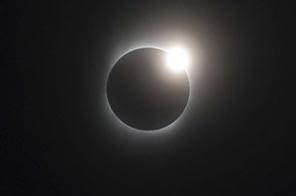Thousands gather across India
TAREGNA: The longest solar eclipse of the 21st century created near darkness soon after dawn in a swath of India stretching from the west coast to the northern plains where millions gathered in the open to watch.
But millions more shuttered themselves in, gripped by fearful myths in a country that abounds in Hindu mythology-based superstitions and fables, one of which says an eclipse is caused when a dragon-demon swallows the sun.
A thick cloud cover over India that had obscured the sun when the eclipse began at dawn parted in several cities, minutes before the total eclipse — caused when the moon covers the sun completely to cast a shadow on earth — at 6.24 a.m. (0054 GMT).
"We were apprehensive of this cloudy weather but it was still a unique experience with morning turning into night for more than three minutes," said Amitabh Pande, a scientist with India's Science Popularization Association of Communicators and Educators, after watching the eclipse.
One of the best views of the complete eclipse, shown live on several television channels, appeared to be in the town of Varanasi, on the banks of the Ganges river, sacred to devout Hindus.
Thousands of Hindus took a dip in keeping with the ancient belief that bathing in the river at Varanasi, especially on special occasions, cleanses one's sins. The eclipse was seen for 3 minutes and 48 seconds.
The eclipse visible only in Asia will move north and east from India to Nepal, Myanmar, Bangladesh, Bhutan and China.
Scientists said the Indian village of Taregna would have the clearest view, where thousands of scientists, nature enthusiasts and students gathered.
Their party was spoiled by thick clouds and overnight rains, but even that was welcome news for the agricultural area which has seen scant rainfall this monsoon season
"It would have been nice to see the solar eclipse but the rain is far more important for us," said Ram Naresh Yadav, a farmer.
At its peak, the eclipse lasted 6 minutes and 39 seconds in other parts of Asia.
It is the longest such eclipse since July 11, 1991, when a total eclipse lasting 6 minutes, 53 seconds was visible from Hawaii to South America. There will not be a longer eclipse than Wednesday's until 2132.
Scientists set up telescopes and other equipment in Taregna a day in advance to make the most of the window of opportunity provided by the eclipse.
A 10-member team of scientists from the premier Indian Institute of Astrophysics in Bangalore and the Indian air force plan to fly and film the eclipse, an air force press release said.
But millions across India were shunning the sight and planned to stay indoors.
Even in regions where the eclipse was not visible, pregnant women were advised to stay indoors in curtained rooms over a belief that the sun's invisible rays would harm the fetus and the baby would be born with disfigurations, birthmarks or a congenital defect.
Krati Jain, a software professional in New Delhi, said she planned to take a day off from work Wednesday to avoid what she called "any ill effects of the eclipse on my baby."
"My mother and aunts have called and told me stay in a darkened room with the curtains closed, lie in bed and chant prayers," said Jain, 24, who is expecting her first child.
In the northern Indian state of Punjab, authorities ordered schools to begin an hour late to prevent children from venturing out and gazing at the sun.
Others saw a business opportunity: one travel agency in India scheduled a charter flight to watch the eclipse by air, with seats facing the sun selling at a premium.
Additional police and paramilitary troops were posted around Patna and Taregna after Maoist rebels called for a strike Wednesday to protest increases in the price of gas and other essentials.
The rebels, who say they are inspired by Chinese revolutionary leader Mao Zedong, often target police and government workers.
"Adequate numbers of forces have been deployed at Taregna where top scientists and researchers are gathering to view the celestial wonder," said R. Mallar Vizhi, a senior superintendent of police in Patna.






